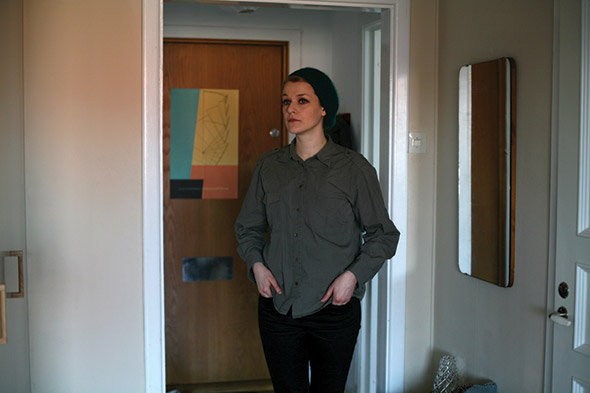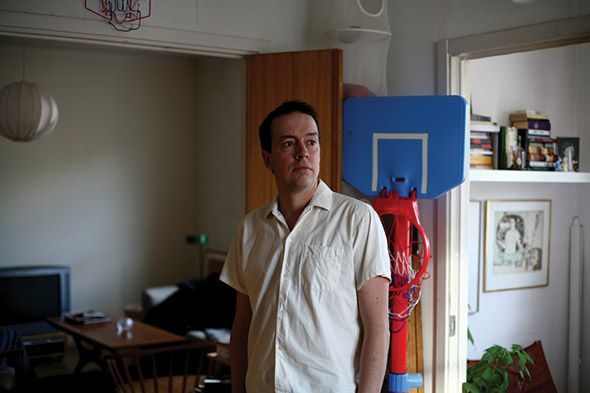
José González

El Perro Del Mar

Martin McFaul

Frida Hyvönen
Text by Nina Renata Aron
Photographs by Chris Mottalini
Considering Sweden’s size and its relatively homogenous cultural and ethnic makeup, the nation’s musical offerings are far more dynamic than one might expect. With roots in Nordic folk – a melancholic, Slavic-sounding affair thick with accordion – Swedish music has evolved to encompass most recognizable strains of contemporary music and formulated dozens of its own unique sounds, styles and scenes, none of which are circumscribed by urban borders. In fact, the Swedish “scene” is a veritable national phenomenon.
The smug, snarling riff-rock revival that made its way to American shores a few years ago with the Hives at its helm may have gotten the kids on their feet, but it offered a deceptively simple representation of Swedish music and the people who make it. In the past half-century, Sweden has produced delicious guilty-pleasure pop (ABBA, Roxette, the Cardigans) and an enormous store of heavy metal. And while these rockers range wildly in quality and irony-level; it should be noted that if the apocalypse comes, Sweden would certainly have the soundtrack with radically innovative guitar-driven rock (Refused) and sultry, make-out-friendly mood music (the Concretes).
The Swedish music scene today is one that fosters collaboration and community, and the intriguingly nuanced music that it’s producing is shot through with sincerity, humility and refreshing playfulness. This is music that strains to keep safe from the rabid forces of marketing and far from the stylized campaigns of an image-based popular culture. It is organic, genuine, and tied unabashedly to its home and the environment in which it is born and raised. Much of it somehow feels Swedish. But best of all, it actually feels, blessedly, new.
The delightfully diverse army of Swedish artists featured in these pages deserves a spot on the American cultural radar. They’ve simply got what you want – exceptional talent, ingenuity in spades, and that elusive Scandinavian je ne sais quoi: a cool so cool it hurts.
Jens Lekman’s got range. Sometimes he sounds like a painfully frank folk-rock front man; more often, he’s invoking the cool, finger-snapping ease of a lounge singer. With album titles like When I Said I Wanted to be Your Dog, song titles like “I Don’t Know if She’s Worth 900 Kronor,” and lyrics like, “Oh, Silvia, I was dancing to Michael Jackson / Oh, Silvia, when I heard your German accent,” it’s tempting to leap into instant comparisons – to Stephin Merritt (Magnetic Fields), Morrissey or even Yo La Tengo’s cleverer efforts. And Jens Lekman does, at times, sound like all of these artists. But beyond his lyrical leanings and abiding wit, Lekman’s work is indebted to many other traditions, from the storytelling impulse of ’60s protest folk (“Do You Remember the Riots?”), to the twinkly electronic add-ons of more recent pop. The prolific young songwriter incorporates samples and examples from dozens of influences, lending to the listener a sense of his own sympathies and his own record collection, which only makes his songs more charming. The artful balance that Lekman achieves – of affect and sonic sincerity – is impressive, and the result is orchestral and quietly grand.
If Lekman’s music is the kind that makes listeners open windows and sip something on the first warm day of the year, then listening to José González might feel a bit like driving down a winding road in blackness. There’s something scary in the intimacy of the experience, and it demands attention. González, a bona fide star in Sweden, has a chillingly lonesome voice that teems with wisdom, honesty and nostalgia over an open-tuned acoustic guitar. Comparisons to Nick Drake or Jason Molina of Songs: Ohia abound, but González’s musicianship is a phenomenon all its own. His extraordinary guitar playing, rich with Latin technique, possesses an already legendary quality, while his dazzling dexterity draws fans to his live shows. His fame owes in part to an achingly pretty cover of the song “Heartbeats” by ingenious fellow Swedes the Knife (which appears on his full-length album, Veneer). However, González’s own compositions are no less powerful. This artist’s varied influences – including the Latin leanings of his Argentine-born father – grant his songs a surprising depth, and his hushed, delicate melodies soothe like lullabies.
The music of El Perro Del Mar (a one-woman band featuring Swedish songwriter Sarah Assbring) is a deep, satisfying blue. The vocals are mopey, though fortunately lacking self-pity, and the lyrics are lovely and glum. In “Party,” she croons, “I don’t wanna cause no trouble / I just wanna be a part of you” with a heartbreaking desperation that harkens back to the most honest broken-down moments of music. But implicit references to the more frivolous ticks of old girl-groups (with requisite hand-claps or backup “oohs”) and a detectable reverence for jazz performance, Motown and even Neil Young save the songs from straightforward gloom, complicating and layering their emotional content. On her website, the artist describes her project as a means of achieving a sort of transcendence; she does it “to live inside the music, to close the door on the outside world.” Happily for the listener, El Perro Del Mar succeeds in granting the same gift to her audience – the swells of her music offer at once a haunting distraction, and a pleasant refuge from the clamor of real life.
There is something definitively ’60s about Martin McFaul’s melodies, and the thematic ground he takes up in his songs only heightens the potential for association. The wonderful and strange thing about McFaul’s music, however, is that it somehow embodies all of the ’60s. In fact, it’s like a road trip through the decade; McFaul stays for long stretches on the safe, main roads of accessible pop, breaking to cruise on pretty scenic routes – the places where he meanders intricately and shows his love of guitar-driven folk – and even occasionally crashing for a spell in the raucous camp of psychedelia. His tunes are atmospheric, and something sullen lurks at their core. A 40-year-old father of three, McFaul is clearly not merely aping the musical traditions of yore because they’re trendy or because they work. Rather, it is as if the music is in his bones.
Frida Hyvönen creates songs so unpretentious they’re like water from a source that has not yet been tapped. Though her peculiarly jaunty tunes contain many musical quotations – including nods to Joni Mitchell, Mary Timony and others – they possess a sense of urgency that can make them seem like impromptu performances. And indeed, most of Hyvönen’s songs are written in one go before a piano. Her combination of unexpected piano chords, stuttered rhythms and unusual, beautiful melodies give Hyvönen’s songs resonance and intensity. At times, they feel as much like acts in a play as songs on a record. In the video for “The Modern,” Hyvönen sits radiantly in a clownish, puff-sleeved ball gown, as she plays a flaming piano. Much of her music’s equally spectacular and has the capability of being brilliantly awe-inspiring. Observing and listening to this performer/performance artist imparts the excitingly voyeuristic sense one gets while watching a crazy person have a creepily rollicking good time.

